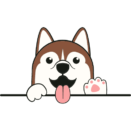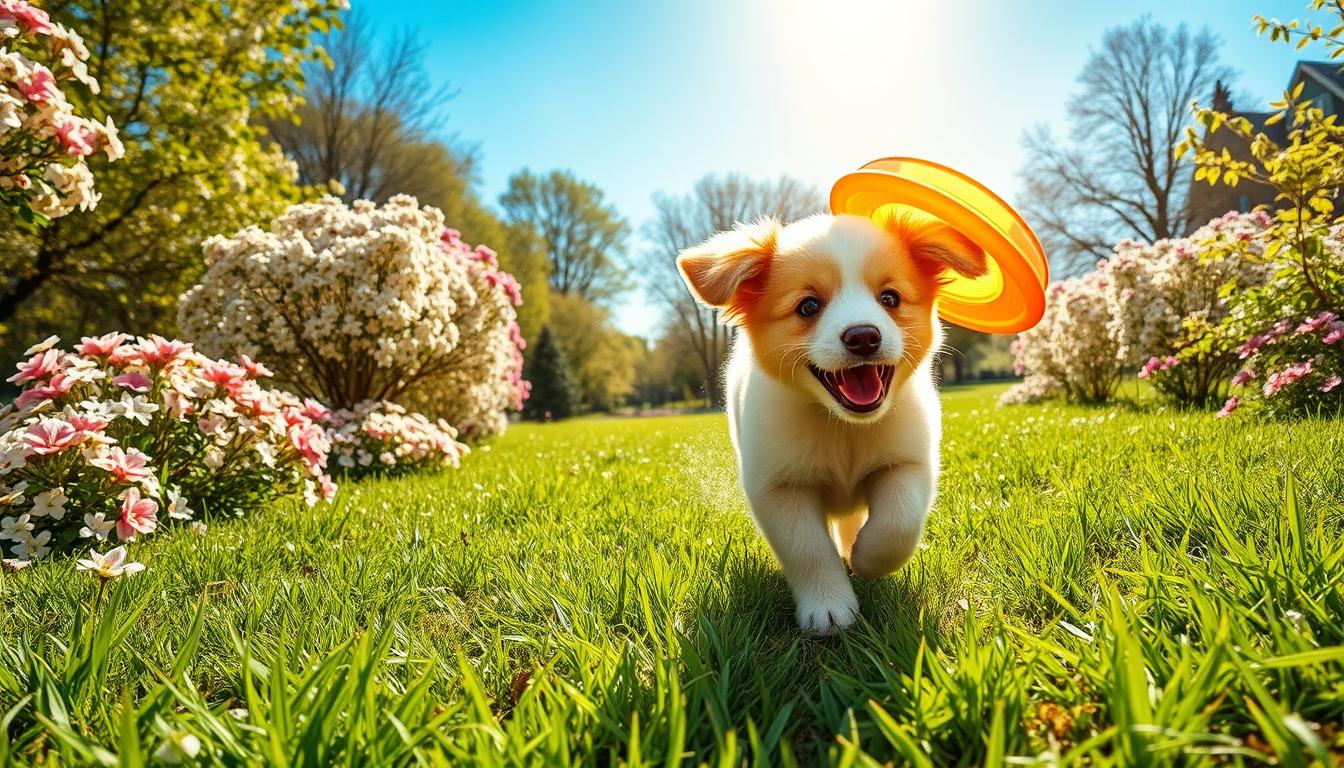Are you getting a new puppy and wondering how to keep them active? It’s important to have a good exercise plan for your puppy’s health. But, where do you start?
This guide will help you create a daily exercise plan for your puppy. You’ll learn about the right activities for their age and how to keep their mind sharp. You’ll be on your way to raising a happy, healthy puppy.
Key Takeaways
- Establishing a daily routine is crucial for your puppy’s sense of security and well-being.
- A well-planned schedule can make life easier for both you and your furry friend.
- The first few weeks are the ideal time to start building good behaviours and habits.
- A balanced exercise routine should include a mix of physical activity and mental stimulation.
- Consulting with your veterinarian can help you determine the right type and amount of exercise for your puppy’s specific needs.
The Importance of Establishing a Routine for Your Puppy
Bringing home a new puppy means setting up a routine. Puppies love knowing what’s next, which makes them feel safe and secure. A consistent schedule helps them adjust to their new home and promotes good habits.
Creating Structure and Security for Your New Furry Friend
Puppies need a routine to feel at home. It helps them learn when and where to go to the bathroom. A good routine includes activities and times for meals, play, and rest.
Benefits of a Routine for Both Puppies and Their Owners
A puppy routine makes caring for a new pet easier. It balances play, rest, meals, and training. You can adjust the times to fit your life but keep the structure.
Starting a puppy routine helps them grow and fit into your family. By 6 months, they should know basic commands and be well-socialized. Training them well is key for a well-behaved dog later on.
https://www.youtube.com/watch?v=7tVJSbcHJVw
“Establishing a routine early on can aid in faster toilet training, as puppies learn when and where it’s appropriate to relieve themselves.”
Feeding Your Puppy: A Guide to Mealtimes and Schedules
Looking after a new puppy means planning their meals carefully. Unlike older dogs, puppies usually eat three times a day. A regular puppy feeding schedule helps with good puppy eating habits and makes housetraining simpler.
Plan your puppy’s mealtime routine around your own meals. This way, they get the nutrients they need all day. Always keep their water bowl clean and full. Staying hydrated is key for their puppy nutrition.
| Puppy Age | Feeding Frequency |
|---|---|
| 4-12 weeks | 3-4 times per day |
| 3-12 months | 2 times per day |
| 12 months+ | 1-2 times per day |
Large-breed puppies need a special diet to help their bones grow. They might take up to 18-24 months to grow up. Talking to your vet can help make sure your puppy’s food schedule is right for them.
Having a set puppy mealtime routine is key for their health. By sticking to these tips and watching your puppy grow, you can make sure they get the food they need to be happy and healthy.
Potty Break Scheduling: Minimizing Accidents and Promoting Success
To help your puppy learn to go potty outside, you need a regular routine. Puppies need to go out every two to four hours. They also need a trip outside after meals and playtime.
Understanding Your Puppy’s Age and Bladder Control
Knowing how old your puppy is and how well they can hold their bladder is important. As they get older, they can hold it longer. The “month-plus-one” rule helps figure out how long a puppy can hold it. For example, a 3-month-old puppy can hold it for about 4 hours.
Establishing a Consistent Potty Routine
- Take your puppy outside at least every two to four hours, and immediately after meals, naps, and playtime.
- Associate mealtime with bathroom breaks by taking your puppy outside after every meal.
- Maintain a consistent feeding schedule, as a puppy’s internal clock is still developing, making predictability crucial during potty training.
- Avoid punishing your puppy for accidents, as this can lead to fearfulness and more accidents. Instead, focus on positive reinforcement and consistency.
By understanding your puppy’s age and bladder control, and setting up a regular potty routine, you can reduce accidents. Remember, being patient and consistent is key to a strong bond with your puppy.
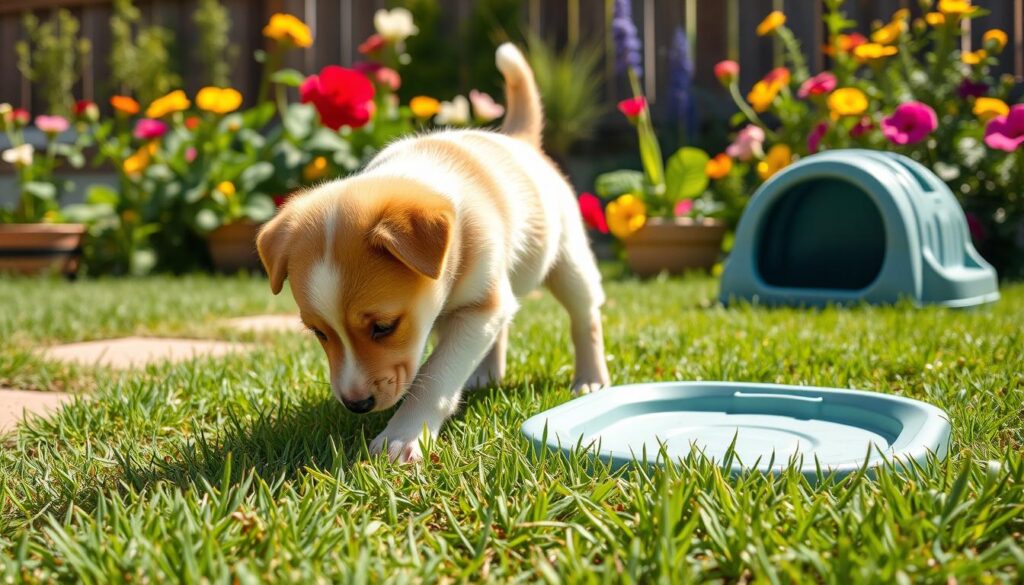
How to Plan Your Puppy’s Daily Exercise Routine
Creating a good exercise plan is key for your puppy’s health. The right amount and type of exercise depends on your puppy’s age and breed. It’s important to mix physical activity with mental challenges. Avoid hard exercises like long runs or jumping, as they can harm young bones and joints.
Age-Appropriate Exercise for Puppies
Start with five minutes of exercise per month of age, done twice a day. For example, a three-month-old puppy needs 15 minutes, split into two sessions. This helps their body grow and adapt safely.
Mix of Physical and Mental Stimulation
- Regular walks, playtime, and training are great for your puppy’s exercise.
- Activities that challenge their minds, like puzzle toys or basic training, are good for their brain.
- Introduce your puppy to new people, animals, and places to help their mental and physical growth.
- Different dog breeds have unique needs that should be met in their daily routine, like herding or retrieving.
By balancing physical and mental exercises, you’ll keep your puppy healthy, happy, and well-adjusted as they grow.
The Importance of Playtime and Bonding
Playtime is key for your puppy’s daily life. It keeps their mind and body active. Games like fetch and tug-of-war help burn energy and strengthen your bond.
Interactive Playtime for Mental and Physical Development
Puppies need lots of play and attention from their owners. Interactive puppy playtime is crucial for their growth. It keeps them active and sharpens their senses.
Playtime also boosts their problem-solving skills. It deepens the bond between you and your puppy. This time is essential for their emotional and physical health.
By spending time playing with your puppy, you meet their physical needs. You also help their emotional growth. This builds a strong, lifelong bond.
“Playtime is the cornerstone of a puppy’s healthy development. It’s where they learn, explore, and forge an unbreakable bond with their human family.”
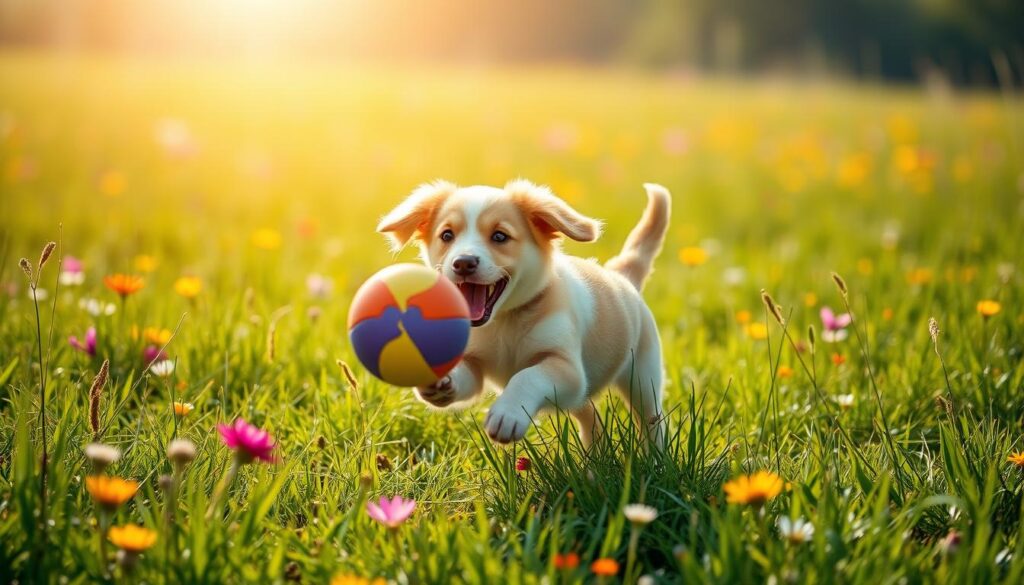
For a well-rounded puppy, balance is key. Make sure they get enough rest, food, and potty breaks. A consistent routine with play, rest, and care ensures a happy life for your puppy.
Nap Times: Allowing for Proper Rest and Recovery
Puppies sleep a lot, up to 16-18 hours a day. It’s important to have a puppy nap schedule to help them grow well and avoid getting too tired.
Young puppies need lots of puppy rest and recovery to grow fast and learn. If they don’t get enough sleep, they might get anxious, aggressive, and not listen as well.
Make sure your puppy has a quiet, comfy spot to sleep. Letting them have their puppy nap time helps them stay healthy and happy.
| Puppy Age | Average Sleep Hours per Day | Awake Hours per Day |
|---|---|---|
| 2-3 months | 18-20 hours | 4-6 hours |
| 4 months | 16-18 hours | 6-8 hours |
| Adult Dog | 13 hours | 11 hours |
Puppies need sleep for their bodies and brains to grow. Without enough sleep, they might not groom well, play less, and get stressed easier.
“Dogs sleep between 16 to 20 hours per day, and as a species, they should be resting 60-80% of the day, which equals 15 to 20 hours a day.”
Knowing your puppy’s sleep needs and following their nap schedule helps them grow strong. It also makes life better for you and your puppy.
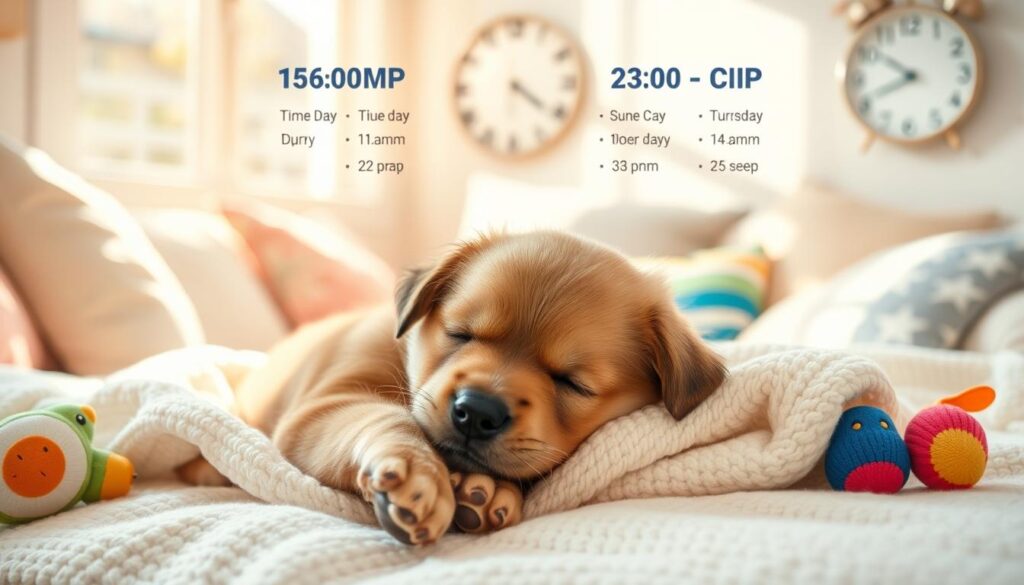
Crate Training: A Valuable Tool for Routine and Structure
Crate training is a great way to help your puppy get into a routine. It gives them a safe place to rest and relax. This is important for their daily schedule.
Puppies love a structured day, and crate training helps with that. For an 8-12 week old puppy, training should be 5-10 minutes, 2-3 times a day. They also need 5 minutes of exercise for every month of age, up to twice a day.
Training your puppy in a crate has many benefits. It helps them learn to calm down and gives you a break. They should rest in the crate for 1-2 hours, 3 times a day, plus overnight. They also need 1-2 hours of separation time, 1-2 times a day.
To crate train successfully, stay calm and consistent. Start with 10 minutes in the crate and gradually increase. Watch how your puppy behaves when you’re away for a bit, like getting a cup of coffee. You can choose from wire, plastic, or soft crates, depending on what your puppy likes.
Remember, crate training takes at least six months. Be patient and dedicated, and your puppy will learn to love their crate. For more help, consider joining an online Virtual Puppy School.
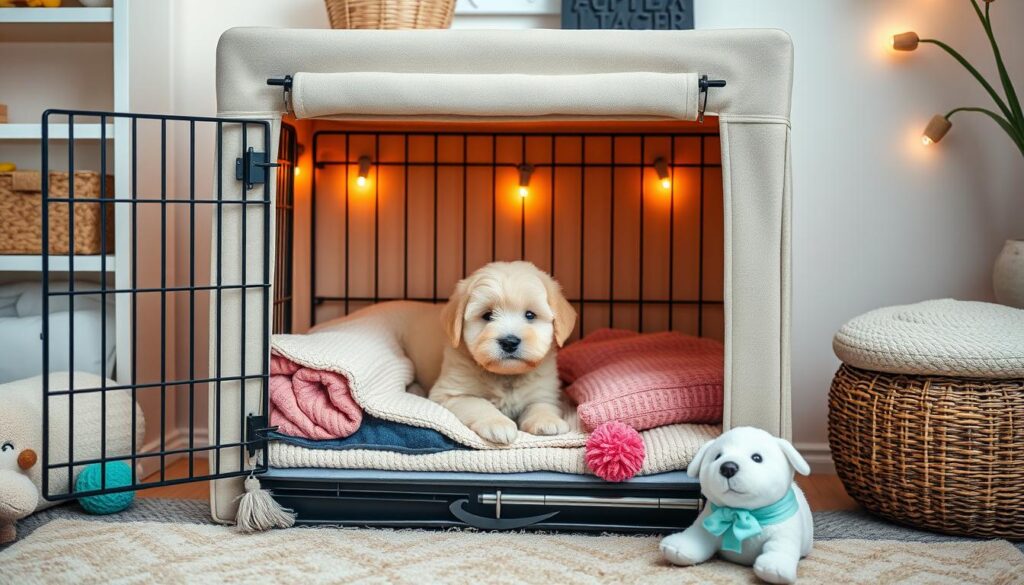
Adjusting the Routine as Your Puppy Grows
As your puppy grows, their daily routine needs to change. The routine you set up when they were 8 weeks old might not fit anymore. By watching your puppy’s signs and adjusting their routine, you help them grow well.
Modifying the Schedule to Accommodate Growth and Development
Start a routine with your puppy when they’re 8 weeks old. This routine should include early morning bathroom breaks. It also needs to fit your life. Giving them a treat after they go can help them learn.
As they grow, they’ll sleep less, from 18-20 hours to 12-14 hours. Their meals will change too, from 3-4 small meals to 3 meals a day by 4 months.
Exercise times will also change. Start with short walks, then make them longer. Give them toys that match their age, like balls and puzzle toys, to keep them active and happy.
Being flexible and listening to your puppy is key. Update their routine, meals, and playtime as they grow. This way, they’ll always get the care they need to be happy and healthy.
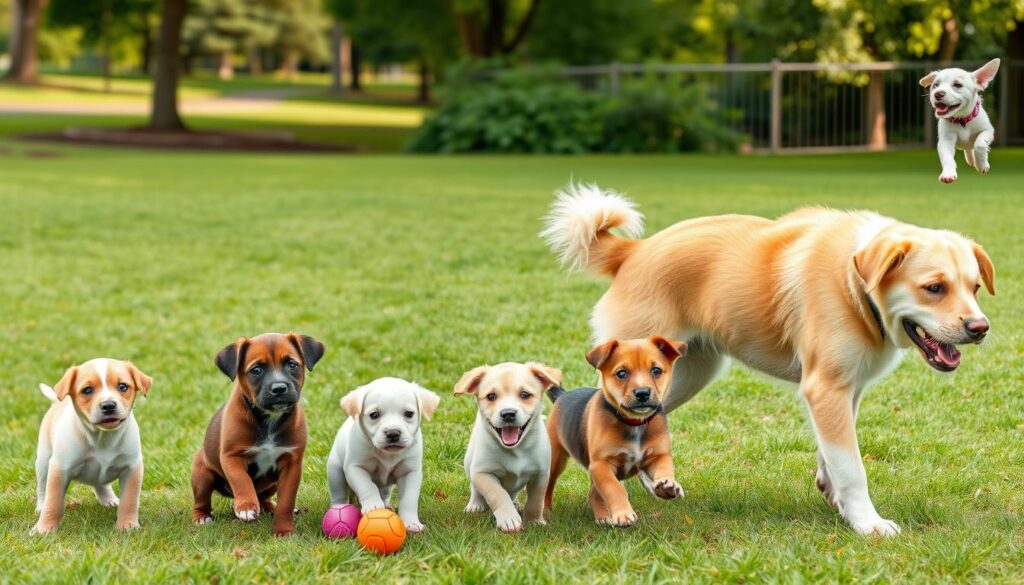
Conclusion
Creating a daily routine is key for your puppy’s happiness and growth. It helps them feel safe and learn good habits. Make sure to include feeding, potty breaks, exercise, and nap times in their schedule.
Be ready to change the puppy schedule as they grow. This flexibility is important for their development.
Building a daily routine takes patience and consistency. It’s good for both you and your puppy. Puppies love routine, which helps with training and adjusting to a new home.
The first week is especially important. It sets the tone for their future habits.
A well-planned puppy daily routine means a well-behaved dog. Having clear goals and tracking progress keeps everyone motivated. With the right steps, you and your puppy can enjoy a lifelong friendship.
